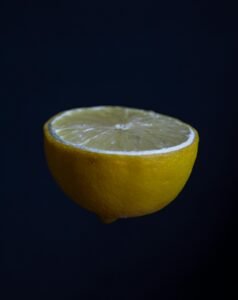Wellhealthorganic.com: Lemon Juice Know Home Remedies to Easily Remove Dark Spots
Dark spots also known as hyperpigmentation can be a source of frustration for many individuals striving for clear and radiant skin. While there are numerous remedies available one natural solution that often gains attention is lemon juice. In this article we’ll delve into the effectiveness of lemon juice as a home remedy for dark spots and explore how to incorporate it into your skincare routine.
Introduction to Dark Spots and Lemon Juice
Dark spots are areas of the skin that appear darker than the surrounding areas due to an excess production of melanin. They can be caused by various factors such as sun exposure hormonal changes aging and skin injuries. Lemon juice with its natural bleaching properties is often touted as a remedy to lighten these spots and promote an even skin tone.
What Causes Dark Spots?
Before exploring remedies it essential to understand the root causes of dark spots. Sun exposure is a primary factor as ultraviolet UV rays stimulate the production of melanin in the skin. Hormonal changes such as those during pregnancy or with the use of certain medications can also lead to increased pigmentation. Additionally skin injuries like acne or inflammation can trigger the formation of dark spots.
Benefits of Using Lemon Juice for Dark Spots
Natural Bleaching Properties
Lemon juice contains citric acid which acts as a natural bleaching agent. This acidity helps to lighten dark spots and promote a more uniform complexion over time.
High Vitamin C Content
Vitamin C abundant in lemon juice is known for its antioxidant properties. It helps to combat free radicals and promote skin regeneration which can contribute to reducing the appearance of dark spots.
Exfoliation
In addition to its bleaching properties lemon juice acts as a gentle exfoliant. It helps to remove dead skin cells revealing fresh skin underneath and potentially reducing the visibility of dark spots.
Precautions and Risks
While lemon juice can be beneficial for some it essential to proceed with caution as it may cause adverse reactions in certain individuals.
Sensitivity and Irritation
Lemon juice is highly acidic and can cause irritation redness or stinging sensations particularly for those with sensitive skin. It advisable to perform a patch test before applying lemon juice directly to the face.
Photosensitivity
Lemon juice can increase the skin sensitivity to sunlight potentially leading to sunburn or further pigmentation issues. It crucial to use sunscreen and avoid sun exposure after applying lemon juice to the skin.
How to Use Lemon Juice for Dark Spots
There are several methods for incorporating lemon juice into your skincare routine to target dark spots effectively.
Direct Application
One simple method is to apply fresh lemon juice directly to the dark spots using a cotton ball or pad. Leave it on for about 1015 minutes before rinsing with lukewarm water.
Dilution with Water or Other Ingredients
To reduce the risk of irritation lemon juice can be diluted with water or mixed with other soothing ingredients like honey or aloe vera gel. This helps to mitigate the acidity while still reaping the benefits.
Lemon Juice Face Mask Recipes
For a more intensive treatment lemon juice can be combined with other natural ingredients to create face masks tailored to your skin needs. Recipes often include ingredients like yogurt turmeric or oatmeal for added benefits.
Other Home Remedies for Dark Spots
While lemon juice is a popular choice there are alternative home remedies worth exploring.
Aloe Vera
Aloe vera gel is known for its soothing and hydrating properties. It can help to reduce inflammation and promote healing making it a suitable option for addressing dark spots.
Apple Cider Vinegar
Apple cider vinegar contains acetic acid which may help to lighten dark spots and balance the skin pH levels. It typically diluted with water before application to prevent irritation.
Honey
Honey is praised for its antibacterial and moisturizing properties. When applied to the skin it can help to fade dark spots while leaving the skin soft and supple.
Incorporating Lemon Juice into Skincare Routine
To maximize the benefits of lemon juice for dark spots consider incorporating it into your regular skincare routine. This might involve using lemoninfused products or applying lemon juice treatments at strategic points in your regimen.
When to See a Dermatologist
While home remedies like lemon juice can be effective for some individuals persistent or severe dark spots may require professional intervention. If dark spots fail to respond to home treatments or if you experience any concerning symptoms it advisable to consult a dermatologist for personalized guidance and treatment options.
Final Word
In lemon juice offers a natural and accessible solution for addressing dark spots and achieving a more even skin tone. However it essential to use it cautiously and be mindful of potential risks especially for those with sensitive skin. By understanding the causes of dark spots and incorporating lemon juice into a comprehensive skincare routine individuals can take proactive steps towards clearer healthier skin.
FAQs
Is lemon juice suitable for all skin types?
Lemon juice can be harsh on sensitive or dry skin types. It advisable to perform a patch test and dilute it before applying it to the face.
How long does it take to see results with lemon juice?
Results may vary depending on the individual and the severity of the dark spots. Consistent use over several weeks is typically necessary to notice significant improvement.
Can lemon juice be used to treat acne scars?
While lemon juice may help to lighten acne scars it essential to consult a dermatologist for comprehensive acne treatment.
Are there any alternatives to lemon juice for treating dark spots?
Yes other home remedies like aloe vera apple cider vinegar and honey can also be effective for addressing dark spots.
Can lemon juice be used on the body for dark spots?
Yes lemon juice can be applied to dark spots on the body but it crucial to avoid sun exposure afterward to prevent further pigmentation issues.


























+ There are no comments
Add yours